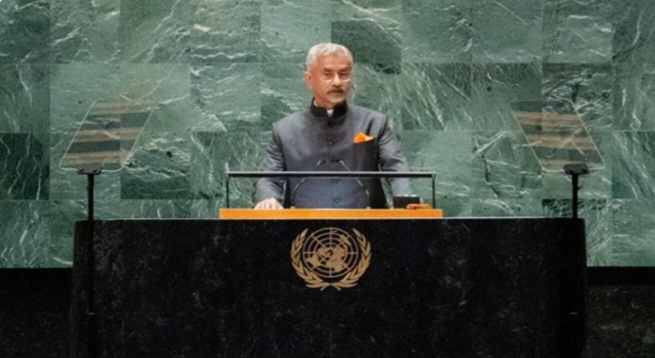Last Updated on September 29, 2024 8:33 am by INDIAN AWAAZ
AMN / WEB DESK
India’s External Affairs Minister Dr S Jaishankar has stated that Pakistan’s policy of cross-border terrorism will never succeed and actions will certainly have consequences. He said this while addressing the 79th session of the UN General Assembly in New York last night.
Dr Jaishankar said the issues to be resolved between the two countries are the vacation of illegally occupied Indian territory by Pakistan and the abandonment of its long long-standing attachment to terrorism.
The External Affairs Minister criticised the neighbouring country, saying that Pakistan’s misdeeds have affected others as well, especially the neighbourhood. He said Pakistan’s GDP can be measured in terms of radicalisation and its exports can be measured in the form of terrorism.
He observed that Pakistan is now facing its own karma and underlined that a dysfunctional nation coveting the lands of others must be exposed and countered.The External Affairs Minister said the world cannot be fatalistic about the continuation of violence on a large scale. He said that whether it is the war in Ukraine or the conflict in Gaza, the international community seeks urgent solutions. He stressed that terrorism is antithetical to everything that the world stands for, and all its forms and manifestations must be resolutely opposed.
He also opined that the sanctioning of global terrorists by the United Nations should not be impeded for political reasons. Dr Jaishankar called for reforming multilateralism, saying the urgency of this call is highlighted by the theme of the UNGA session – Leaving No One Behind. He said that an effective, efficient, and more representative UN is essential.Dr Jaishankar stressed that advancing peace, ensuring sustainable development and strenghtening human dignity cannot be delivered by a UN paralysed with division, conflict, terrorism and violence. He said these goals cannot be reached if access to food, fuel and fertiliser is jeopardised.
He said that when capturing markets lacks restraint, it damages the livelihood and social fabric of others. He added that evasion of climate action responsibilities by the developed nations undermines the growth prospect of the developing countries. Dr Jaishankar said the problems arise from a combination of structural shortcomings, political calculations, naked self interest and disregard for those left behind.The External Affairs Minister said that India supports the 79th UNGA theme of Leaving No One Behind. He said this is a difficult time, when the world is yet to recover from the COVID pandemic, and the war in Ukraine is into its third year. He noted that the conflict in Gaza is acquiring wider ramifications. Dr Jaishankar expressed concern that across the Global South, development plans have gone off the rails, and SGD targets are receding. He added that unfair trade practices threaten jobs and unviable projects raise debt levels.The Minister expressed concern that the world stands fractious, polarized and frustrated. He said conversations and agreements have become difficult and this is not what the founders of the United Nations would have wanted. The External Affairs Minister also stated that connectivity that flouts sovereignty and territorial integrity acquires strategic connotations especially when it is not a shared endeavour. He said technological advancements which have long been a source of hope are now equally a factor of anxiety and climate events occur with greater intensity and frequency. He added that food security is as worrisome as health security.Dr Jaishankar said India has sought to respond in a variety of ways to these challenges, including by focusing on the issues of the vulnerable and fashioning targeted policies for their betterment. He said assured access to piped water, electricity and cooking gas and news homes are changing millions of lives.
He said the gender gap has started to close in schools and workplaces, and food producers get financial support thrice a year by the government. He further stated that the third term of the Narendra Modi government has made skilling of the youth one of its key priorities.

